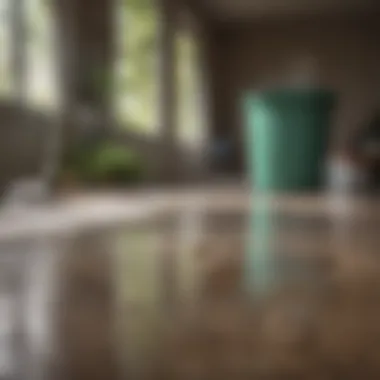Essential Supplies for Deep Cleaning Your Home


Intro
Deep cleaning your home is essential for maintaining a healthy and welcoming environment. While regular cleaning helps, a thorough approach is necessary to reach areas that often go unnoticed. This guide seeks to provide clarity on the essential supplies you need to deep clean your home effectively.
Understanding which products and tools are necessary can significantly simplify the process. Each area in your home has unique cleaning needs, requiring different approaches and items. By equipping yourself with the right supplies, you'll not only improve the hygiene of your living space but also make the process more efficient and effective.
This article will cover essential tools, cleaning agents, and best practices, aiding you in achieving a spotless home. Emphasizing the importance of using appropriate cleaning supplies will foster a better understanding of how to maintain your home. Let's delve deeper into the supplies that will empower you to tackle your cleaning tasks like a pro.
Understanding Deep Cleaning
Deep cleaning is an intricate process that goes beyond standard household cleaning. It necessitates a thorough approach, targeting areas often overlooked in routine tasks. Those who appreciate the nuances of a clean home recognize the vital role this practice plays in fostering a hygienic and inviting environment. Understanding deep cleaning is essential as it not only enhances the aesthetic appeal of one’s living space but also contributes significantly to overall health and well-being. By comprehending what deep cleaning entails, individuals can select the right supplies and techniques tailored to effectively cleanse their homes from top to bottom.
Definition of Deep Cleaning
Deep cleaning refers to an intensive cleaning process that goes beyond the surface. It includes tackling dirt, grime, and allergens that accumulate over time in hard-to-reach places. Unlike standard cleaning, which may address only visible surfaces, deep cleaning involves cleaning behind and underneath furniture, in cracks and crevices, and other areas that often do not get regular attention. Some key aspects of deep cleaning include:
- Thorough vacuuming of carpets and upholstery
- Dusting ceiling corners and light fixtures
- Scrubbing tiles and grout in bathrooms and kitchens
- Decluttering and organizing spaces like closets and drawers
Overall, the intent of deep cleaning is to restore the home’s condition and maintain its value.
Difference Between Regular and Deep Cleaning
The distinction between regular cleaning and deep cleaning is critical for maintaining a healthy living environment. Regular cleaning generally involves daily or weekly tasks such as dusting surfaces, wiping counters, and vacuuming high-traffic areas. It emphasizes appearance but may neglect deeper hygiene concerns.
Conversely, deep cleaning encompasses a broader scope and requires more time and effort. It not only removes visible dust and dirt but also targets hidden allergens, bacteria, and grime buildup. Key differences to note include:
- Frequency: Regular cleaning is done frequently, while deep cleaning is recommended every few months, depending on the household’s needs.
- Scope: Regular cleaning focuses on visible areas; deep cleaning aims for a comprehensive clean of the entire space.
- Time Consumption: Regular cleaning tasks can take a couple of hours, whereas deep cleaning can last several hours to a whole day, depending on the size of the home.
"Deep cleaning is not just about aesthetics; it's about creating a healthier living environment."
Understanding these differences empowers homeowners to adopt a more strategic approach to their home maintenance routine. By integrating both regular and deep cleaning, one can ensure a consistently clean and inviting home.
The Importance of Deep Cleaning
Deep cleaning holds paramount significance for effective home maintenance. Unlike regular cleaning, which often addresses superficial dirt and clutter, deep cleaning delves into the less visible layers of grime. This process is essential not only for aesthetic enhancement but also for the overall health of the home's inhabitants. Understanding its importance is crucial for homeowners aiming for a truly clean living space.
Health Benefits
One of the foremost reasons for deep cleaning is its direct impact on health. Regular exposure to dust, allergens, and bacteria can lead to respiratory issues and allergies. Deep cleaning minimizes these risks by thoroughly eliminating dust and other pollutants.
In addition, deep cleaning involves sanitizing surfaces. This step is especially vital in high-traffic areas or communal spaces within the home, such as kitchens and bathrooms. Using disinfectants can greatly decrease the presence of harmful microorganisms. In summary, the health benefits of deep cleaning are significant: it promotes better air quality, reduces allergy triggers, and creates a safer home environment.
Aesthetic Improvements
Aesthetic improvements are readily apparent after a deep cleaning session. Homes that undergo this thorough process often exhibit a noticeable lift in appearance. Surfaces shine, carpets look revitalized, and lingering odors dissipate. This transformation can boost mood and contribute to a sense of well-being.
The psychological effect of living in a clean space should not be underestimated. Visitors and family members can appreciate the difference in cleanliness. An appealing environment might even enhance the overall enjoyment of the space. Thus, deeper cleaning emerges not only as a necessity but as a route to creating a more inviting atmosphere.
Longevity of Home Assets
Finally, deep cleaning contributes to the longevity of home assets. Regular build-up of dirt can harm surfaces, flooring, and even appliances. Certain materials require specialized care to maintain their appearance and functionality over time.
Routine deep cleaning can extend the life of items like carpets, furniture, and cabinetry. By removing unwanted debris and stains, homeowners can prevent permanent damage, saving costs on replacements in the long run. Protecting one's investment in home assets is additionally a practical consideration in the decision to engage in deep cleaning.
"Deep cleaning is an investment in your home’s future, ensuring its aesthetic appeal and functional integrity."
Essential Cleaning Supplies


Cleaning supplies are at the core of any deep cleaning strategy. Having the right tools and products can significantly affect the efficiency and effectiveness of the cleaning process. This section outlines essential cleaning supplies, elucidating their roles and benefits in achieving a spotless environment.
General Cleaning Tools
Microfiber Cloths
Microfiber cloths are indispensable for any cleaning process. Their unique weave allows them to pick up dirt and dust effectively without the need for additional cleaning agents. This characteristic makes them both eco-friendly and cost-efficient. Furthermore, the durability of microfiber means they can last through many washes, making them a popular and beneficial choice for deep cleaning.
However, these cloths need to be washed properly to maintain their effectiveness. They can lose some of their dust-trapping abilities if washed with fabric softeners. Overall, microfiber cloths offer great value for those looking to maintain a clean home.
Scrub Brushes
Scrub brushes are essential for tackling tougher stains on various surfaces. Their bristles come in different stiffness levels, which can be selected based on the cleaning task at hand. A more rigid brush can remove ingrained dirt or stains in grout and tile, making it a valuable tool in deep cleaning.
One major advantage is the ergonomic design that many scrub brushes have, allowing for better grip and reduced hand fatigue. Despite their effectiveness, some brushes can scratch delicate surfaces if not used carefully, so choosing the right brush for each job is crucial.
Buckets
Buckets may seem simple, but they are vital for organizing and using cleaning solutions effectively. They help in carrying water and cleaning solutions and can also be used for rinsing. A bucket with a wringer can be particularly advantageous during mopping tasks, as it allows for easy moisture control.
The versatility of buckets makes them a popular choice for various cleaning tasks around the home. However, larger buckets can be cumbersome to carry and may take up extra storage space.
Floor Cleaning Equipment
Mops
Mops are critical in maintaining clean floors. They are designed to cover large areas with ease. Different types of mops, such as sponge mops and microfiber mops, facilitate the cleaning of various flooring types. Microfiber mops, for instance, can trap dirt and require less cleaning solution, enhancing the cleaning process.
An important consideration is that replacement pads or heads are often needed for mops, which adds to overall cleaning costs. Nonetheless, investing in a high-quality mop can save time and energy in the long run.
Vacuum Cleaners
Vacuum cleaners play a significant role in deep cleaning by removing accumulated dirt, dust, and allergens from carpets and floors. They come in various styles, including upright, canister, and robotic. The ability to efficiently suck up particles without disturbing the rest of the environment makes them essential for thorough home cleaning.
Moreover, vacuum cleaners equipped with HEPA filters can significantly reduce airborne allergens, benefiting those with respiratory issues. A disadvantage to consider is that vacuum cleaners can be costly, and maintaining them often requires purchasing bags or filters.
Floor Polishers
Floor polishers help in restoring shine to hard floors. They can remove scratches and help keep the floor looking new. They usually have different settings for various flooring types, which is a distinct advantage. Using a floor polisher makes it feasible to avoid manual scrubbing, thus saving time and effort.
However, they can be heavy and difficult to maneuver for some users. Understanding how to use them correctly is important to avoid damaging the floors.
Surface Cleaning Products
All-Purpose Cleaners
All-purpose cleaners are formulated to work on a variety of surfaces, making them highly versatile cleaning solutions. They effectively cut through grease and grime on counters, appliances, and even floors, making them indispensable in any cleaning arsenal.
The convenience of using a single product for multiple tasks is one of its key characteristics. However, it’s essential to read the labels, as some all-purpose cleaners may not be suitable for delicate surfaces such as wood or granite.
Glass Cleaners
Glass cleaners are specifically crafted to leave windows and mirrors streak-free. They usually contain ammonia or vinegar-based solutions that effectively eliminate smudges. The clarity left after using glass cleaners is often superior to using regular surface cleaners.
One downside is that some glass cleaners can emit strong fumes, necessitating proper ventilation while using them. Nonetheless, their ability to enhance visibility through glass surfaces makes them a valuable choice for consumers.
Disinfectants


Disinfectants are critical for ensuring spaces remain hygienic, especially in high-touch areas such as kitchens and bathrooms. They eliminate germs and bacteria, thus contributing to a safer living environment. Many disinfectants are formulated to handle different surfaces without causing damage.
The key feature of disinfectants is their efficacy in killing bacteria and viruses. However, they can sometimes have a harsh chemical smell and require safe handling. Proper usage can mitigate these disadvantages, ensuring cleanliness without compromising health.
Specialty Supplies
Carpet Cleaners
Carpet cleaners, whether commercial or home-based, are designed to deep-clean carpets effectively. They often use steam or shampooing methods that can remove deeply embedded dirt or stains. Their unique formulations ensure thorough cleaning without damaging carpet fibers.
A disadvantage is that carpet cleaners can be costly to purchase or rent. Additionally, drying times can be lengthy after cleaning, which may be inconvenient.
Upholstery Cleaners
Upholstery cleaners are tailored to clean fabric-covered furniture. They can come in spray form or as dedicated machines. Their specialty lies in effectively removing stains while being gentle on the fabric.
One important factor is that not all upholstery cleaners are compatible with all fabric types, so it's crucial to understand the material before proceeding. This specificity highlights the unique advantages and potential risks associated with using these products.
Stain Removers
Stain removers are essential in targeting specific stains and marks, ensuring a more thorough cleaning process. There are many varieties available, from those designed for food stains to ink marks. Their targeted approach allows homeowners to deal with stubborn spots more effectively than general cleaners.
One downside is that relying on stain removers for extensive cleaning can sometimes lead to buying multiple products, which may be cost-prohibitive. Yet, their effectiveness in spot cleaning makes them a necessary addition to any cleaning supply list.
To achieve the best cleaning results, consider organizing your supplies and understanding each item’s distinct role in your cleaning routine.
Organizing Your Cleaning Supplies
Keeping your cleaning supplies organized is critical for a successful deep cleaning regimen. When supplies are easy to access and neatly arranged, it saves time and reduces stress during the cleaning process. An effective organization system can streamline the way you prepare for and execute your cleaning tasks, allowing you to focus on achieving a sparkling home.
Creating an Inventory
Establishing an inventory of your cleaning supplies is the first step in getting organized. This list should include all the products and tools you currently own, categorized by their function. For instance, record items such as:
- Microfiber cloths
- Scrub brushes
- Wood polish
- Glass cleaner
Having such an inventory aids in identifying what you have, what you need, and what may be wasted or expired. Regular updates to this inventory ensure you remain stocked with necessary items without unnecessary duplicates. Moreover, consider noting the quantities of each item for better planning on future shopping trips.
Storage Solutions
Storing your cleaning supplies in a methodical manner saves time and energy. Use clearly labeled bins or caddies to group supplies by type or cleaning task. Here are some effective storage solutions:
- Baskets: Use baskets for bulky items like mops and brooms. Label each basket for clarity.
- Shelving Units: Install shelving units in closets or utility rooms. This keeps all supplies visible and accessible.
- Under-Sink Organizers: Utilize drawer organizers under sinks to keep your surface cleaning products neatly arranged.
By implementing these storage strategies, not only do you enhance your cleaning efficiency, but you also simplify the maintenance of your inventory.
"An organized cleaning supply area can drastically improve your cleaning routine, making deep cleaning less daunting."
Creating an organized system for your cleaning supplies not only boosts efficiency but also promotes a sense of control over your surroundings. This is essential for maintaining a clean and hygienic home.
Safety Measures While Cleaning
When engaging in deep cleaning tasks, safety must be a prime consideration. The cleaning process can expose individuals to various hazards. These include toxic chemicals, irritants, and even physical injuries from using certain tools. By emphasizing safety measures, homeowners can prevent accidents and protect their well-being. Proper precautions enhance the overall cleaning experience, ensuring it is effective and safe.
Using Protective Gear
Wearing protective gear is essential when tackling tough cleaning projects. This gear includes gloves, masks, and goggles, each having distinct benefits that can prevent health issues and improve safety during cleaning tasks.


Gloves
Gloves serve as a barrier between your skin and harmful substances. They protect against various irritants found in cleaning solutions. The key characteristic of good cleaning gloves is their durability. Rubber or latex gloves are commonly recommended for their ability to withstand harsh chemicals. These gloves continue to be a popular choice due to their protective qualities. However, some individuals may have allergic reactions to latex, making non-latex alternatives like nitrile a beneficial option. Nitrile gloves have the additional advantage of being puncture-resistant, which adds to their appeal.
Masks
Masks are a crucial protective item when deep cleaning. They help filter out dust, fumes, and irritating particles in the air. A key characteristic of effective masks for cleaning is their filtration level. N95 respirators, for example, are designed to protect against fine particulates and harmful vapors. Their widespread usage in various cleaning scenarios showcases their effectiveness. However, it is critical to ensure a proper fit to achieve the best protection. Masks can be uncomfortable to wear for extended periods, which may deter some individuals from using them consistently.
Goggles
Eye protection is often overlooked, yet goggles are an important safety measure. They prevent splashes from cleaning products and shield the eyes from dust and debris. The primary characteristic of a good pair of goggles is a tight seal around the eyes. This feature ensures that no particles can enter, providing comprehensive protection. Many homeowners appreciate goggles for their straightforward usability. One disadvantage, however, is that they can fog up during use, hindering visibility and potentially causing distractions.
Safe Handling of Chemicals
Using cleaning chemicals safely is crucial. Different products can pose risks if not handled appropriately. It is essential to follow manufacturer instructions for safe usage. Always read labels for warnings and usage guidelines.
Key Practices for Safe Chemical Handling:
- Store chemicals in designated areas: Ensure they are out of reach of children and pets.
- Use proper ventilation: Always clean in well-ventilated spaces to reduce inhalation risks.
- Never mix chemicals: Mixing different cleaners can create toxic fumes, which can be very dangerous.
- Dispose of chemicals properly: Follow local regulations for safe disposal of chemical products.
By abiding by these safety measures, homeowners can ensure that deep cleaning is both efficient and respectful of personal health.
Environmental Considerations
In an era where environmental sustainability is a growing concern, the approach to deep cleaning one’s home radiates far beyond mere aesthetics. It underscores a significant intersection between cleanliness and ecological mindfulness. Choosing products that minimize harmful impacts on the environment not only promotes personal health but also contributes to a larger cause—protecting the natural world around us.
One must realize that many conventional cleaning products contain chemicals that can be detrimental, not just to human health but also to our planet. By opting for eco-friendly cleaning supplies, you reduce harmful chemical runoff into waterways and lower the overall toxic footprint on your living space. Moreover, eco-friendly products often utilize biodegradable ingredients, making their disposal less burdensome on landfills.
Choosing Eco-Friendly Products
When selecting eco-friendly cleaning products, consider items with natural ingredients that are effective yet gentle on the environment. Look for certifications such as EPA Safer Choice or USDA Organic, as these indicate adherence to environmental safety standards. Brands like Seventh Generation and Method have built a reputation for producing non-toxic, biodegradable cleaning solutions.
An effective strategy is to create a basic list of essential green products:
- Vinegar: A powerful natural disinfectant.
- Baking Soda: Great for scrubbing surfaces and removing odors.
- Lemon Juice: Offers antibacterial properties and a pleasant scent.
- Castile Soap: A versatile soap derived from natural vegetable oils.
These products can be combined to create custom cleaning solutions tailored to various tasks in your home.
Recycling and Disposal of Cleaning Supplies
Recycling and proper disposal of cleaning supplies play a crucial role in maintaining ecological balance. Many cleaning product containers are recyclable, yet often, people do not utilize these systems properly. Empty bottles and cans should be rinsed out and sorted according to local recycling guidelines. When it comes to products like batteries or hazardous chemicals, it’s essential to consult local disposal instructions to ensure they’re handled in a way that safeguards both public health and the environment.
Taking the time to educate oneself about the disposal methods is incredibly valuable. Be aware that certain localities may have specific events or programs for hazardous waste collection. Participating in these ensures that potentially harmful materials do not find their way into the ecosystem.
"The smallest change can make big difference. By choosing eco-friendly solutions and proper disposal practices, individuals contribute to a collective effort toward a sustainable future."
Finale
In the context of home maintenance, deep cleaning serves as an essential practice to uphold hygiene and aesthetic appeal within a living space. The conclusion of this article distills the core points discussed, reaffirming the significance of employing appropriate supplies for a thorough cleaning regimen. Families, homeowners and design enthusiasts alike can recognize that the choices made in cleaning products can significantly alter both the condition of their homes and their quality of life.
Recap of Core Supplies
A systematic approach to deep cleaning requires a well-structured arsenal of supplies. Here is a quick overview of the core supplies you need:
- Microfiber Cloths: Ideal for dusting and cleaning surfaces without leaving streaks.
- Scrub Brushes: Essential for tackling tough stains and grime.
- Buckets: Useful for mixing cleaning solutions and rinsing tools.
- Mops: For cleaning floors effectively.
- Vacuum Cleaners: Important for capturing dust and debris, especially in carpets and upholstery.
- All-Purpose Cleaners: Versatile solutions for various surfaces.
- Glass Cleaners: To achieve streak-free shine on windows and mirrors.
- Disinfectants: Critical for eliminating germs and bacteria.
- Carpet and Upholstery Cleaners: Key for maintaining fabric cleanliness.
By utilizing these supplies, homeowners can ensure cleanliness and hygiene throughout their homes, thereby enhancing both comfort and safety.
Encouragement for Homeowners
Deep cleaning need not be a daunting task. It can serve as a rewarding activity that not only cleans the home but also rejuvenates the mind. As you embark on this cleaning endeavor, remember that maintaining a clean environment has lasting benefits. It not only improves the aesthetic appeal of your space but also fosters a healthier living environment.
Investing time in understanding and utilizing the right supplies will yield tangible results. A clean home invites peace and well-being, which is invaluable. So, gather your essential supplies and approach the task with a methodical mindset. Your efforts will certainly be reflected in the overall ambience of your home.







